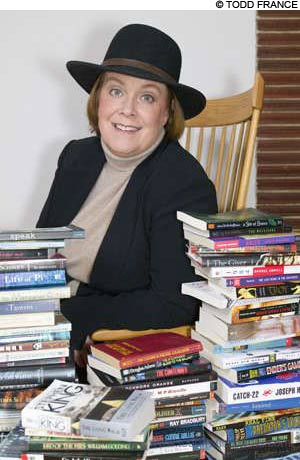
Anita Silvey will be speaking at the Porter Square Books,
Porter Square Shopping Center
25 White Street, Cambridge
Wednesday, January 21st @7PM
617-491-2220 |
In her near-40-years working in the field of children's literature, Boston-area resident Anita Silvey has been everything from a publisher, to an editor, an author, a lecturer, a reviewer, and even a professor. Until last year, the only title this Simmons College instructor had never quite managed was that of children's book author. She had written books like 500 Great Books for Teens and 100 Best Books for Children, about children's literature, but had never undertaken the task herself, until now. With I'll Pass for Your Comrade: Women Soldiersin the Civil War, Silvey dives into her newest role as children's author with a bang.
Silvey writes that while women are often represented in historical accounts of the Civil War as nurses, laundresses, and sanitary workers (think Clara Barton and Dorothea Dix); there are a number of women who have remained unacknowledged. Besides the supporting roles during the Civil War, women were active participants; they secretively dressed up like men and fought, despite regulations against their service, and have gone (until recently) ignored. Such women include Loretta Janeta Velazquez, a Confederate soldier who took the name Lieutenant Harry T. Buford; Mary Galloway, who saw action in one of the most brutal battles; and Malinda Blalock, the only woman to have fought on both the side of the Union and the Confederacy. Silvey gives a voice to these women long forgotten and teaches a new history lesson to those most impressionable.
You have been involved in the field of children's literature for a pretty long time...
That's right, a pretty long time. The true figure is 1970. Okay. So that is a very long time.
How did you first get involved?
I was assistant to the publisher of children's books at Little Brown. I thought I was gonna teach kids. I had a master's degree in teaching, but there just weren't any jobs. And someone said, "They're hunting for an editorial person at Little Brown." It was a great deal of fun, a wonderful job. I've been both editor of The Horn Book Magazine and I've been publisher of children's books at Houghton and Clarion.
But in all that time you'd never written a book specifically for kids. What inspired you to finally write one?
It had been something I'd always wanted to do. Sometimes people who put themselves in certain professions around people who are doing the work they really wanna do themselves. And I can tell you [is] that probably in every decade of my life, I had written a children's book. They're all in the files and unfortunately none ever saw the light of day. They're all pretty bad, to be honest. But I kept going back and doing it...
What attracted you to this subject matter?
I'm a great Civil War buff. And suddenly I came on this terrific book, They Fought Like Demons: Women Soldiers in the American Civil War and so that was how it began. It was not a story that I had ever learned as a child and frankly it wasn't a story that I'd heard in 15 to 20 years of reading Civil War history. And I just thought, this is incredible material and if I can find a way to tell a story for children it'd be a great story for children.
Tell me about the women in this book and what makes them so remarkable.
What's so remarkable is that they truly didn't let society define their roles. There were, of course, roles for women during the Civil War. As a "Daughter of the Regiment," you could supply things to the troops, you could be a laundress, a nurse. But these were women who didn't want to support men fighting – they wanted to fight and they found a means and a way to do it. That determination to do something you wanted to do and be willing to do anything that you needed to do; to take this role that nobody in society even wanted them to take. They weren't being asked. In some cases, later in the war, men were forced into the ranks. They are all there absolutely voluntarily, all of the way.
At the time that these women were doing this, was there any precedent for women dressing up like men?
You find it in some of the women's accounts: Sarah Rosetta Wakeman or Jenny Hodgers. They had been dressing up as men for sometime. What they found was that if they dressed up as men, they could get better paying jobs. So obviously some of them came into the ranks already having pulled off this disguise for a while, but in many cases they're mothers. They put the kids in the care of their sister or someone in the family [and go off to fight]. And as best we know, they go back home [after the war] and they may have more children. It was just for this brief period of time they're off to the war and they're dressed like men to do so.